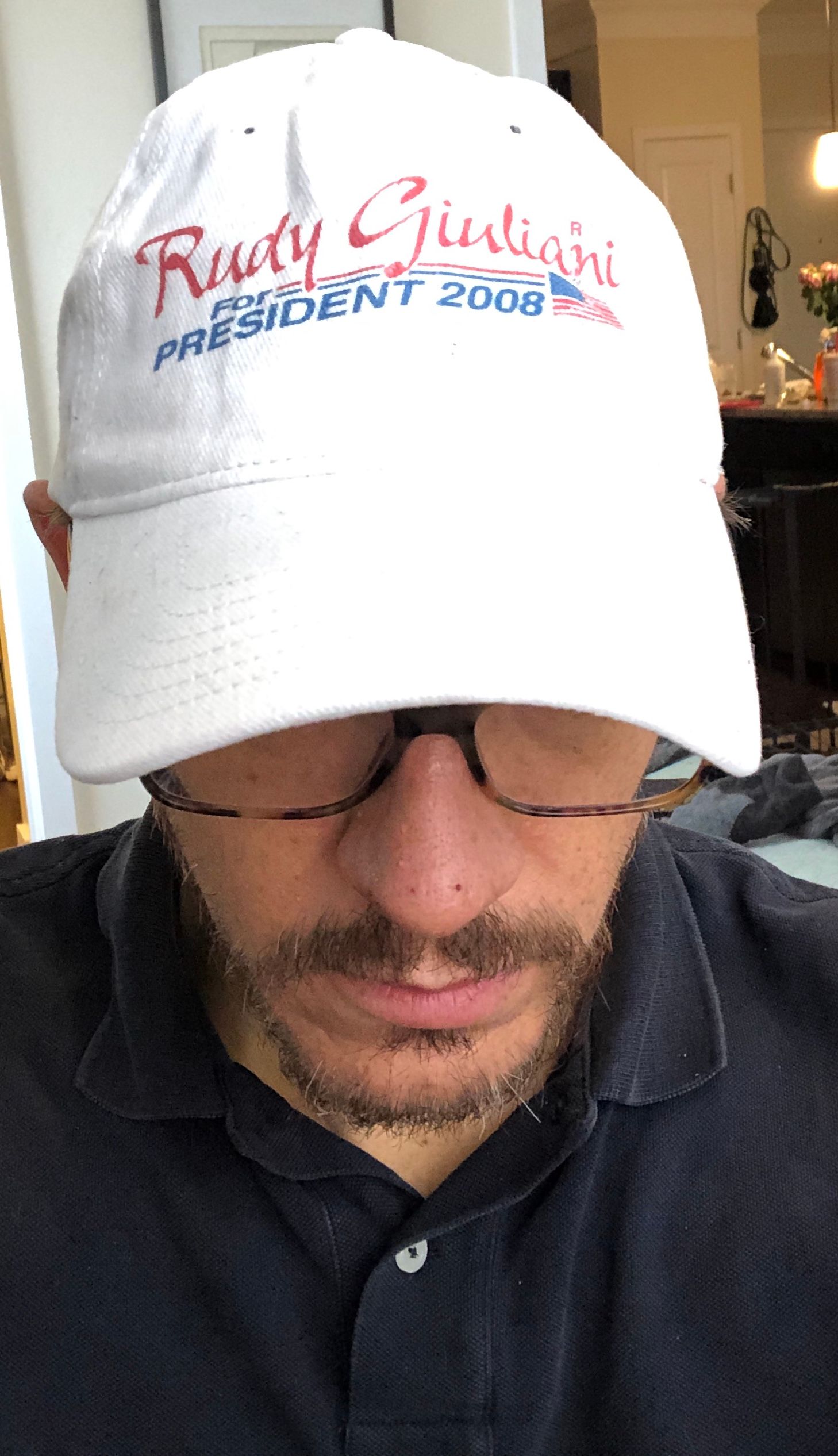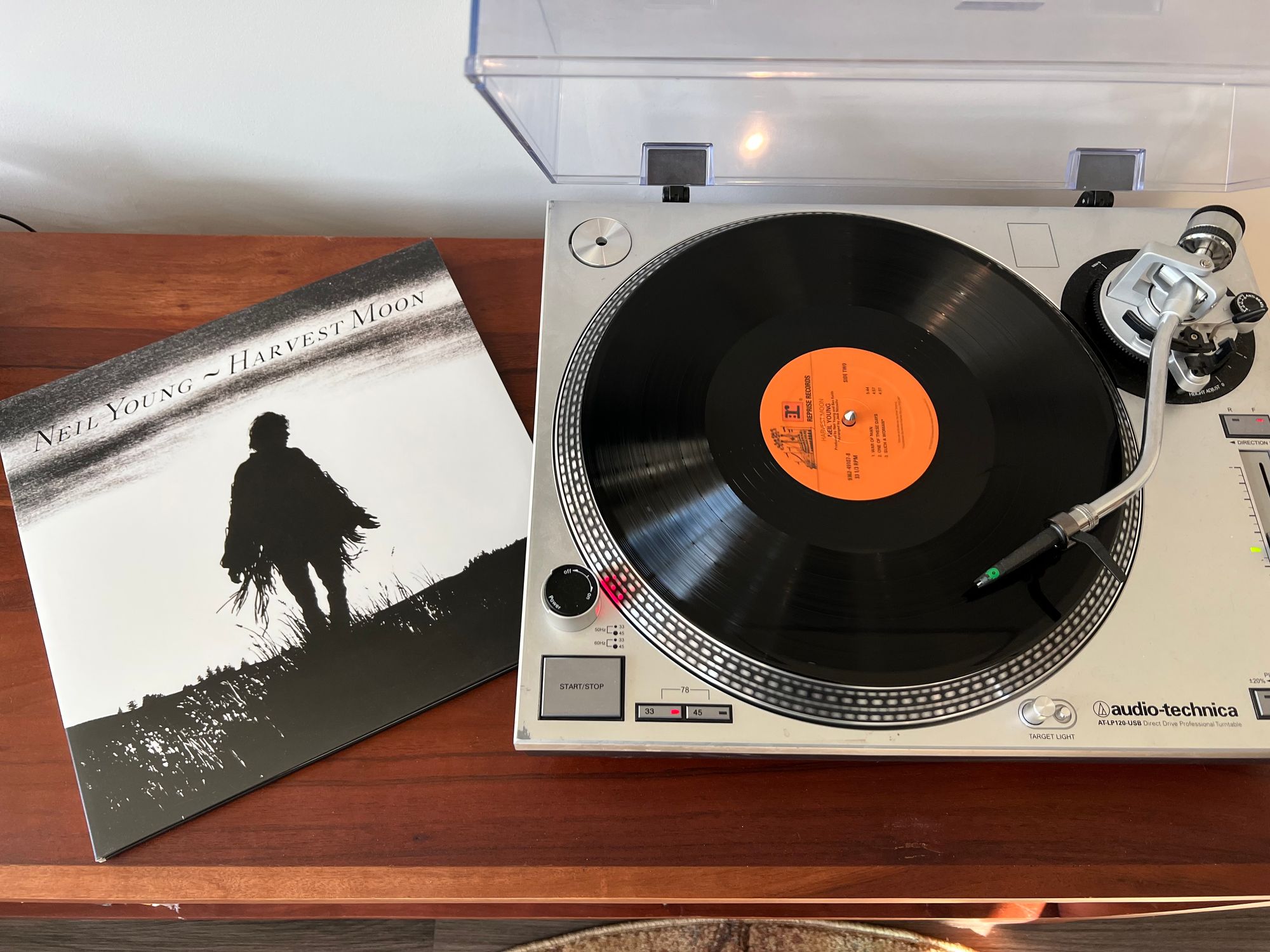OTR, Take 19: Neil Young - Harvest Moon & Harvest
If you want to listen as you read, click here.
This has been a week of extremes, from the weather dropping nearly 50 degrees one day to the next, to a trying week concluded with a wonderful meeting yesterday afternoon that gave me a good jolt of happy brain chemicals. This is a thought that is as trite as it is true: things are never as good as you think they are, nor as bad as you fear they are.
It's so easy to get lost in a temporary feeling, to plumb downward rather than continue forward. But you can always move forward, or backward, take a move laterally. Regardless, you needn't stay in that feeling.
A few weeks ago, I joked that sending me records wouldn't guarantee that I'll feature the record and talk about you, but it wasn't going to hurt those chances. Well, today's record arrived a few days ago and I would perhaps consider it a bribe, but for the fact that my buddy Rob sent me the album. And he has no need to bribe me, as he's already one of my very, very favorite people on earth.
Rob and I have a long history of sending each other ridiculous gifts. For a while, back in a more innocent time in politics, we had an escalating gifting war. In 2007, before Rudy Giuliani had fully ripped off his America's Mayor mask to reveal the sweaty, sniveling bootlick he is, I was in law school and received a package from Rob.

This aggression would not stand, so I sent him a dozen Rand Paul (who was exactly then and now who we thought) heads on popsicle sticks, which Rob rather disturbingly decided to place in his bed as such:

There were several more jousts and parries in this low-stakes war, but it died away. When I think about it, I suspect it's because what was once fairly mockable in playful ways just became a touch too serious. (Although Rob has taken on a new political project, which you can ask him about if you're curious. Caveat emptor.)
Anyway, when a package from Rob arrives, I always brace myself for what might be inside. I feel like a little kid: what kind of insanity or assholery awaits?
This time, the package that appeared was in a thin, square box. Had Rob not given me the heads up as to what was inside, I might have expected something absurd – Shatner's Christmas album, Shatner Claus, for instance. But Rob sent me a magnificent album, Neil Young's Harvest Moon.

Neil Young is such an interesting musician, in that he has several distinct, independent sounds – and yet every one of those sounds is indelibly him. It's apparent immediately when you're listening to anything Young is involved in.
The first of these is Neil Young, the rock guitar god who invented grunge twenty years before anyone else came close. Forget the Melvins, the U-Men, or Screaming Trees (actually don't: they are amazing bands; RIP Mark Lanegan) – Neil Young (usually with Crazy Horse) is the proto-grunge godfather.
The second sound is Neil Young, the acoustic songsmith. In this iteration, Young writes wrenching, beautiful songs played with acoustic instruments. I would hesitate to call this low-key Neil, because these songs are often intense. They're just quieter.
The third major sound is his work with Crosby, Stills, Nash, and Young, where he serves to disrupt the most perfect three-part harmony rock group in history with his wail and off-kilter songwriting and playing. CSN is great; CSNY is exciting.
(Quick aside about CSNY. When the band were getting back together sometime in the 2000s for a tour, they sat down to figure out setlists – which is important, as they'd need to select a core group of songs to rehearse. A manager brought them a list of all the songs they'd written. There were over 900 songs. They were quite chuffed about this, until the manager pointed out that Young had written over 600 of them.)
Harvest Moon is squarely in the second category: it's acoustic and by turns quietly beautiful, angry, and very funny. Released in 1992, it follows on the heels of one of Young's very loud records with Crazy Horse, Ragged Glory. Young had suffered hearing loss in recording Ragged Glory and touring in support of it, so he decided to retreat and recalibrate.
It's impossible to discuss Harvest Moon without discussing an album he recorded exactly two decades earlier: Harvest. Chances are, you know a bunch of songs on Harvest, even if you haven't listened to the whole album. (Although, given that it is Young's bestselling album, the best-selling record of 1972, and the winner of an avalanche of awards, there's a good chance you're familiar.)
Just listen to how beautifully this track is arranged. Chances are, you remember the guitar, which sounds almost dischordant. But listen to how the bass is there right in the beginning too, and how James McMahon's piano starts to tuck itself into the song in the left channel so that when the drums kick in, there's a wonderfully full sound with only the guitar, piano, and bass. Then the banjo kicks in right before the first chorus and the slide guitar takes it to another level. It all happens so simply, so naturally. I could geek out on the arrangement of this song for days.
Anyway, after Ragged Glory, Young got the idea to invite the musicians he recorded Harvest with back into the studio to track a new album, which became Harvest Moon. These two albums are connected in so many ways.
After Harvest became an unexpected hit, Young became distinctly uncomfortable with his fame and secretly feared the mixed critical reception of the album was correct. The album came on the heels of After the Goldrush, a creative breakthrough for Young, and some critics considered Harvest just a country version of Goldrush. (This is unfair, but it's hard to argue that "Alabama" isn't just a retread of "Southern Man" and, in Young's own words, Skynyrd's "Sweet Home Alabama" delivered a well-deserved counterpunch.)
One thing is undeniable: he ran away from the sound of Harvest. He famously stated that "'Heart of Gold' put me in the middle of the road. Traveling there soon became a bore so I headed for the ditch." The three subsequent albums, referred to as the Ditch Trilogy are some of the darkest and most trenchant work of his career. One way to think about it is that Young pulled at the thread of "The Needle and the Damage Done" on Harvest and found his way to the ditch.
I'm fascinated by this retreat, this instinct to reclaim the spirit of his muse. So many musicians see some success and spend the rest of their careers trying to recreate that magic spark that landed them in the big time. Young (and most others who have meaningful and long careers) seem to have the opposite impulse. They sense the importance of growth, change, exploration.
(Note: this is true for those of us in more prosaic lines of work too. I'll let you do the extrapolation.)
I am even more fascinated by Young's decision to go back to the space that he so vehemently left behind. For nearly twenty years, he ran away from this sound, this group of musicians. He makes it apparent that he has moved on. And then he gets the old band back together for another go round.
A funny alchemy happens when you revisit the past, though. The shadows fall funny and the echoes aren't quite in key. You can recreate the band, but you can't recreate the time. I had the joy of playing music with my buddy Lane last year for the first time in over a decade. After a few minutes of fumbling around, we fell into a remembered space. But it was different, because neither of us was the same musician that we were back when we played regularly. Even when we played old songs, we played them with a changed sensibility. (Interesting, with far more of an edge than when we were younger.)
Harvest Moon has the same DNA as Harvest, but it's an awfully different album. I prefer Harvest Moon. "Harvest Moon" is one of the most subtly romantic songs I've ever heard. It's a song written by an adult who has lived past the initial falling in love stage of relationships and knows that "because I'm still in love with you" is not a throwaway line but a call to arms, a dedication richer and deeper than the shallow thing young people mistake for love.
"War of Man" has an acoustic riff that, if he had written in two years earlier, would have been turned into a roaring, angry, distorted riff played through a fuzzed-out amp. And the restraint and clarity of it on acoustic makes it more menacing.
The entire album is an exercise in restraint. Everything is held back, and the emotion held in abeyance is even more striking for it. It's a lesson I could do well learning.
I'm going to call it here. I could write about Neil Young for ages. I'll leave you with this, from TS Eliot.
We shall not cease from exploration
And the end of all our exploring
Will be to arrive where we started
And know the place for the first time.
Through the unknown, remembered gate
When the last of earth left to discover
Is that which was the beginning;
At the source of the longest river
The voice of the hidden waterfall
And the children in the apple-tree
Not known, because not looked for
But heard, half-heard, in the stillness
Between two waves of the sea.
Hey! I'm writing a book. You can learn about it (and read what I've written of the Shitty First Draft) at www.pennhollow.com.